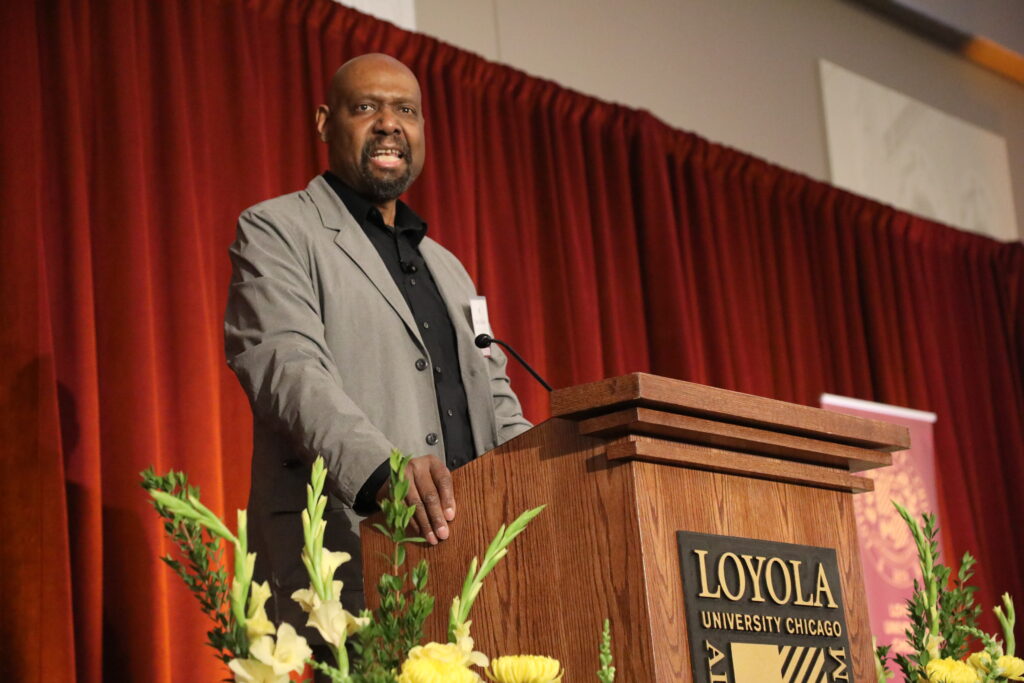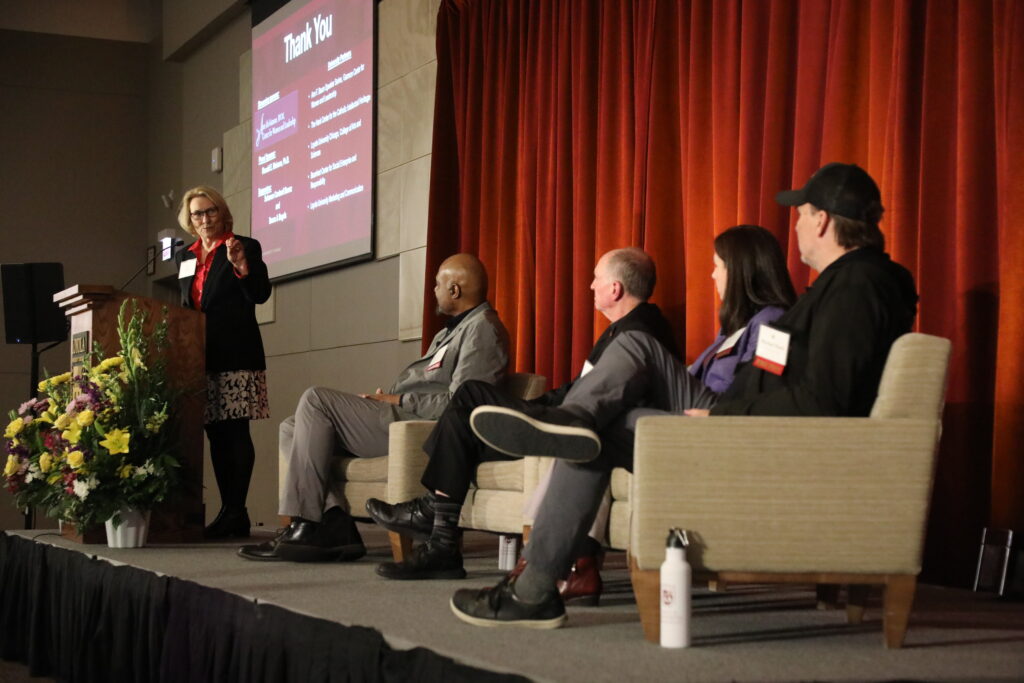Loyola’s School of Environmental Sustainability (SES) hosted its annual Climate Change Conference in the Damen Student Center on the evening of March 16.
Loyola Holds Annual Climate Change Conference, Highlighting the Struggles of Climate Refugees
Loyola hosted its annual Climate Change Conference in the Damen Student Center March 16, with an emphasis on migration driven by climate-induced events.
The event, titled “Climate Refugees: Human Migration in the Era of Climate Change,” consisted of a keynote speech along with individual presentations from climate experts and concluded with a panel discussion.
The keynote speech was delivered by filmmaker Michael Nash. The panelists included senior policy researcher Shelly Culbertson, refugee education advocate Yves Umuhoza, and nonprofit director Rev. Tom Smolich, SJ.
The School of Environmental Sustainability (SES) has been organizing annual climate change conferences since 2016, with each year having its own climate-related topic of discussion, including human health, switching to a green economy and youth-led activism.
On Monday, the Intergovernmental Panel on Climate Change released a report citing how the Earth is set to cross a “critical threshold” for global warming within the next 10 years, according to The New York Times.
The conference started with a reading of Loyola’s land acknowledgement statement, followed by an introduction from Margaret Faut Callahan, the chief academic officer and provost at Loyola.
Callahan began by emphasizing the importance of combating climate change for the university as well as for prospective students.
“Loyola launched a far-reaching campus sustainability initiative in 2002, and the university has reduced its environmental footprint by over 50% in the past 20 years,” Callahan said.
Callahan also noted how important environmental issues have become to members of Generation Z, citing a poll which found 54% of Loyola’s incoming first-year class who said the university’s commitment to the environment impacted their decision to attend Loyola.
The University Chorale then performed a song entitled “Courage to Change,” whose lyrics denoted the importance of unity in finding a solution to the climate crisis.

Following the performance, conference moderator Steve Bynum, the Diversity, Equity and Inclusion Manager of Chicago Public Media, spoke to the audience. He said the University Chorale’s performance made him emotional, noting how it was a strong reminder for action to be taken.
“It is a cry, it is a plea that we are being beseeched today to do something,” Bynum said. “We possess knowledge that we never had before in humankind, but yet we have never been more captured by darkness, ignorance or indifference.”
Before introducing the keynote speaker and panelists, Bynum apologized on behalf of his generation for leaving the task of addressing the issues of climate change to today’s youth.
“I am from Generation X and from my generation and those who are older, we left you a mess,” Bynum said. “It’s ironic that we are tasked with advising you — we who have brought the world to a point of catastrophic consequences.”
Bynum then gave a brief introduction for each of the panelists, praising their work and expertise on the subject of forcibly displaced refugees.
“Amongst our panelists we have a healer, a searcher, an artist and, virtually from another country, a solver,” Bynum said.
Nash was the first panelist to be introduced. His 2010 documentary “Climate Refugees” focused on the impact of climate change-induced migration and its effects on large-scale populations around the world.
Nash’s portion of the event was preceded by a clip from his work, featuring writer George DiCaprio. Along with his son, Leonardo DiCaprio, the pair will serve as the executive producers for Nash’s upcoming project “Climate Refugees II,” which began production this year.
The filmmaker then spoke about his overall experience in the production of “Climate Refugees,” and his key takeaways from its documentation.
Following Nash’s keynote speech, Umuhoza — a Burundian refugee and the Chief Executive Officer and Chief Engineer at Assorted Energies International (AEI) — gave a brief presentation via Zoom surrounding his field of expertise. AEI was founded by Umuhoza in Zimbabwe, and is a refugee-youth-led organization.
Smolich, the second panelist of the night, has served as the International Director of the Jesuit Refugee Service (JRS) since 2015. JRS is an international Catholic organization dedicated to serving and advocating forcibly displaced individuals around the globe.
Smolich said of the estimated 100 million refugees around the world, women and children make up the majority — around 40% of which are under the age of 18.
He also explained how most migrants, once they are displaced for five years, will most likely retain migrant status for more than 20 years.
Smolich explained how JRS’ goal has been to create programs that strengthen local communities abroad by forming relationships with local Jesuits to address issues brought about by ecological changes and poverty.
“One of the things that we are particularly involved in doing are agricultural projects that teach people to adapt to climate change so they don’t have to move,” Smolich said, citing an example of a project in northeast Nigeria.
Before finishing his presentation, Smolich made it clear the work of his organization is only possible through the perseverance and collaboration with migrant populations around the globe.
“The folks we are privileged to serve would not be there if they did not have hope,” Smolich said. “They are resilient and they will help us figure out what the best ways are to deal with this reality of climate change and forced displacement.”
Culbertson, the event’s third panelist, is the associate director of the Disaster Management and Resilience Program at the RAND Corporation — an American nonprofit think tank focused on global policy.
“I think the bottom line conclusion from a lot of this work is that the system that we have today for managing forced migration is broken and failing,” Culbertson said during her presentation.
Culbertson reiterated how the number of migrants affected by changes in climate is expected to increase dramatically in the coming decades, with estimates ranging anywhere from 25 million to 1.5 billion.
Following Culberston’s remarks, Bynum asked the panelists a series of questions about the current challenges they believe affect forcibly displaced migrants as well as what solutions would be beneficial.
Nancy Tuchman, the founding dean of the School of Environmental Sustainability, was the final speaker of the night, thanking the event’s organizers and sponsors.
After the conference, students and other audience members in attendance, as well as the speakers, gathered together for a reception.

Thomas Crabtree, a second-year environmental policy major, said he thought the conversation on trying to understand and be empathetic towards migrants was important.
“I found the discussion on the fear of the ‘other’ to be really powerful,” Crabtree told The Phoenix.
He also said that while Loyola isn’t necessarily involved in directly aiding climate refugees, they can always be doing more to address the concerns brought about by climate change.
Lilly Walker, a third-year environmental policy major, said she found the event very informative, but wanted a larger student presence.
“There are only a small number of us in our major, it feels like a very small network,” Walker said. “I wish more students would have shown up.”
Charlotte Roos, a second-year environmental studies major, also said she feels there should be more involvement from other departments at Loyola outside of the SES on climate-related issues.
Roos said since climate-related issues are interdisciplinary, departments across the university should be coming together more to raise awareness and discuss solutions to climate-related concerns.
Nash spoke to The Phoenix on the current film he’s working on, “Climate Refugees II,” along with his hopes in cultivating a solution for the climate crisis.
The sequel’s storyline will be crafted from the research and data that has been released in the past decade, resulting in the biggest change from “Climate Refugees,” according to Nash.
“I tend to look at this issue through a set of rose-colored glasses, like, I believe we are going to be okay,” Nash said. “I think there’s gonna be a lot of pain, I think there’s going to be a lot of change, but I think we’re going to figure this out.”
The 2023 Climate Change Conference livestream can be viewed on the School of Environmental Sustainability’s YouTube channel.
This story was written by Jacob Danielson and Angela Ramirez
Featured image by Hunter Minné I The Phoenix

